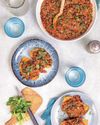
Do me a favour: go and dig in your cupboards to find the healthiest, most nutritionally-abundant ingredient you can. A tin of aduki beans, maybe? Seaweed? Perhaps some stone ground spelt flour? Now flip that packaging over and read the expiry date.
If it's still usable, you're in the minority, because if stats on UK eating habits are to be believed, these ingredients may make it into our cupboards - but they certainly aren't making it to our mouths.
When Professor Tim Spector reported in his book Food For Life (Vintage, £12.99) that 50 per cent of serious diseases are avoidable via 'optimum diet', he highlighted the huge role our attitude to food plays in the way our lives will unfold.
And it's not that we don't try to address this: in the UK, we're on track to spend around £1.7 billion on 'dietetic food' this year. These include the ultra-processed protein shakes and slimline foods that glossy campaigns tell us will speed us to better health. But despite our intentions, few of us are nailing the fundamentals.
Government data published earlier this year suggests only 32 per cent of Brits manage to get their five-a-day.
And our average intake of fibreessential for our bodies to function - is less than two thirds of the recommended amount. The struggle to eat better for our health to take in more essential nutrients and fewer e-numbers - is real, so how do we get our head in the game? One answer might be a more mindful approach to everything we eat; after all, the rich meanings of food in our lives give it a role far beyond simple fuel.
Diese Geschichte stammt aus der September 2024-Ausgabe von Psychologies UK.
Starten Sie Ihre 7-tägige kostenlose Testversion von Magzter GOLD, um auf Tausende kuratierte Premium-Storys sowie über 8.000 Zeitschriften und Zeitungen zuzugreifen.
Bereits Abonnent ? Anmelden
Diese Geschichte stammt aus der September 2024-Ausgabe von Psychologies UK.
Starten Sie Ihre 7-tägige kostenlose Testversion von Magzter GOLD, um auf Tausende kuratierte Premium-Storys sowie über 8.000 Zeitschriften und Zeitungen zuzugreifen.
Bereits Abonnent? Anmelden

Why Are We So Sensitive About Being Sensitive? - Feeling empathy, energy and emotion keenly is not a failing - it can be your strength and your superpower, discovers Yasmina Floyer
All of us are sensitive - it is the very nature of being human. However, as with most behavioural characteristics, it exists on a scale. Jenn Granneman, founder of the world's largest community for introverts and co-author, along with Andre Sólo, of Sensitive (Penguin, £10.99), tells me about the characteristics of someone who is highly sensitive: 'Simply put, if you're a highly sensitive person, your body and mind respond more to the world around you. You respond more to heartbreak, pain, and loss - but you also respond more to beauty, new ideas, and joy. You're more affected by everything around you, but you also draw more from these experiences.

Try a Little Kindfulness - Make kindness a conscious practice and infuse your life with everyday abundance, writes Dr David Hamilton
The more we care about others, the more we realise that most people are just like us - trying to figure things out and hoping for a good day. It's easier to fear what you don't know, but once you get to know people, the world seems a lot smaller and cosier. So next time you're tempted to scroll past someone's problem, dismiss someone's feelings, or just be in your own little bubble, remember: the world's a better place when we all give a little f*ck. Let's sprinkle that stuff everywhere like it's magical kindness glitter!

There's No Excuse to Slow Down! - Presenter, podcaster and author Gabby Logan talks to Psychologies about health, happiness, and overcoming hurdles in midlife...
Presenter, podcaster and author Gabby Logan talks to Psychologies about health, happiness, and overcoming hurdles in midlife...When TV presenter Gabby Logan started to experience brain fog in her late 40s, struggling to recall the correct word or name on live TV, she initially put it down to tiredness. 'I couldn't quite get that name or articulate in the way I had previously been able to, so I was concerned, but it coincided with lockdown and not doing any telly for a while. I remember feeling quite nervous going back to live TV.' But the former international gymnast soon realised that it was a symptom of perimenopause and promptly went onto HRT, which she says has balanced her hormones.

Kindle your creativity
Increase your sense of connection and support your self-expression, urges Caroline Butterwick

Fast and filling!
Join the high-protein revolution and eat better everyday, with these full-of-flavour recipes from nutritionist Scott Baptie's new cookbook

What's your optimum?
Eating well can cure what ails us, so why is it so hard? Anna Blewett discovers the secrets to a more resolved relationship with food...

"FRIENDSHIP DELIVERED SO MUCH OF WHAT ROMANTIC LOVE HAD PROMISED"
Author Marianne Power talks to Psychologies about self-love and the sisterhood...

Summer break or make!
Hello, lovers! September is here, and the lazy holiday season is behind us. And for many-me included - now feels like the perfect opportunity for a personal kick up the backside, and to embark on a relationship reset. In my work, it's typically women who take the first steps accessing couples' help, but recently (and encouragingly) I've noticed an uptick in men reaching out to get relationship advice and wanting to put the work in.

Time to spread their wings
As the seasons shift and shudder, threatening rhythm and routine, Heidi Scrimgeour embraces September in all its bittersweetness...

Big wild world
Caro Giles fills up her cup with summer colour and awaits autumn wonder...